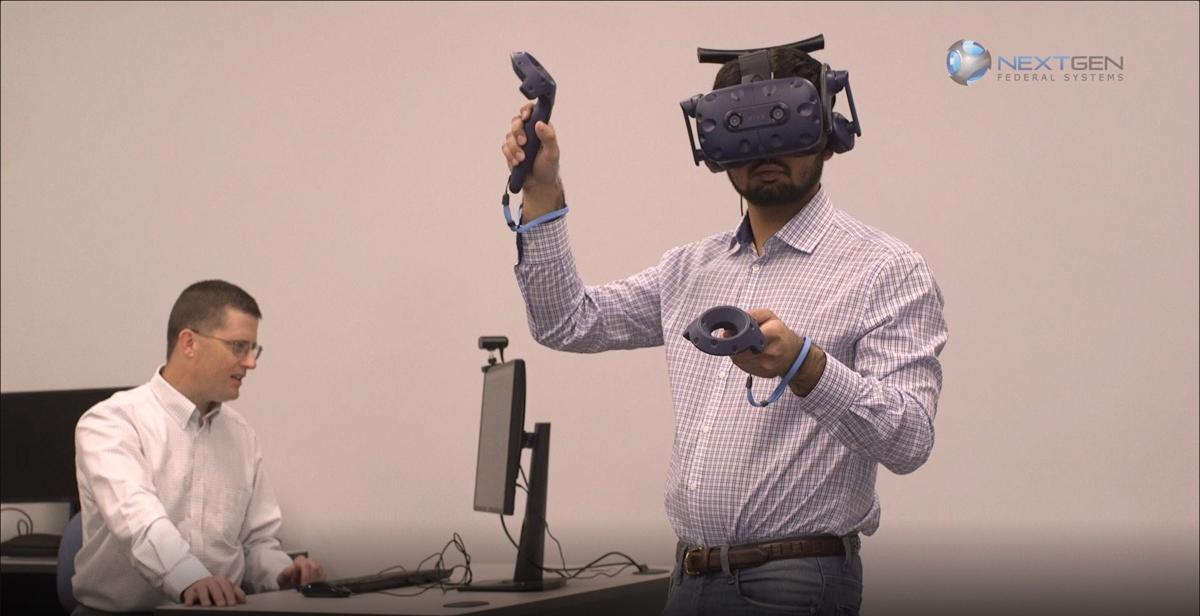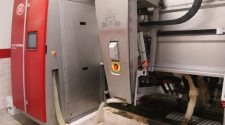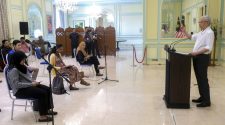MORGANTOWN — Aiming to aid the United States military and other federal entities in their ongoing operations, Morgantown-based NextGen Federal Systems has been hard at work developing new technology through the use of virtual reality, drones and more.
Founded in 2010, the company primarily serves federal defense and intelligence agencies and pushes solutions to current issues through the development of new software and technology, according to Chetan Desai, chief operating officer of NextGen Federal Systems.
“Our military and intelligence services are doing a lot of work, and the number of sensors and actions are increasing exponentially for a number of reasons,” Desai said.
“We have to apply cutting-edge technologies and approaches from more commercial type of systems into these kind of operations. As a company, we believe we are qualified and have the staff to do this.”
The company’s biggest project right now is its independent verification and validation efforts for the Defense Information Systems Agency (DISA), which is stationed at Fort Meade, Maryland.
He said there are several large command-and-control systems deployed worldwide, and it’s NextGen’s job to run testing on the technology that other companies develop.
“Larger companies develop those systems, and then we provide the testing and the cybersecurity and automating and speeding up how this software is deployed in operations,” Desai said. “It happens to be our single largest program in the company right now.”
While independent verification and validation is the company’s largest endeavor, it’s far from its only pursuit. Desai also spoke about a system NextGen is developing for the U.S. Air Force’s mobility command called GLADS, which can provide the military with live updates concerning current and future missions.
“The GLADS system allows continuous monitoring of all the missions that have been planned over the next several weeks, as well as currently operating missions from the standpoint of if any of the situations have changed for that mission,” Desai said. “For example … if there’s a volcanic dust that’s observed and it’s not safe to fly there. This is a situational awareness tool that monitors all of the situations of interest … and if there’s anything that requires replanning or consideration, the system allows you to do that.”
The company also makes heavy use of drone technology, with a specific aim to develop drones that can operate all on their own. Desai said this is important because it eases the workload put on human soldiers and engineers who would be using the devices.
“Our primary focus with drones is how they can operate autonomously,” Desai said. “We don’t want to be managing each drone’s operational software, so a lot of our work is developing autonomy software for those drones.”
One of the major drone projects that NextGen is currently working on will allow the military to surveil bases or regions that it deems remote or unsafe for humans. Desai explained that removing the human element from the project completely means these areas can be scouted without the fear of human lives being lost.
Desai said that the drones can, on their own, decide if there is something of interest in the scouted area to report back to the military for possible human intervention.
“The drones would essentially get a larger area of coverage through the cameras and other kinds of sensors, and they can operate completely autonomously,” Desai said. “They come and fly and capture any things that are of concern … and they can come down to the crowd to charge and another drone would take its place. Essentially, it would allow a big protection capability.”
The company is also working with virtual reality (VR) technology, and how its application can provide first responders, military personnel and others with the training they need without having to drop the person into a live or dangerous scenario, such as the response to a major disaster event.
“The VR technology is well suited for … when you need a lot of training in environments that you cannot create very easily,” Desai said. “For example, if you are in a war-fighting environment and you are looking to breach some tunnels and so forth, it’s hard to do that, but VR allows you to construct those environments without being there. With specialized equipment and software, you can very much simulate being in that environment. Once you wear the gear, you forget you’re not in a real environment.”
NextGen Federal Systems currently has 185 full-time employees and around 35 interns, and despite its growth and the importance of its projects to the country, the company has stayed firmly in West Virginia.
Desai said that decision to stay in The Mountain State is a conscious one, and it proves that important work can be done professionally from just about anywhere in the country.
“From an information and technology perspective, you can actually do the work anywhere,” Desai said. “The reason we chose to be in West Virginia as opposed to some of the metropolitan areas is we have a continuity of workforce, which is important for the research and development work we do. People are here because they love the rural life and everything else that West Virginia has to offer, and we often draw upon employee pools that have West Virginia connections. …
“I think people are looking for good quality of life and good quality of work, and that’s what we offer for potential employees.”
Fairmont News Editor John Mark Shaver can be reached at 304-844-8485 or [email protected].


















